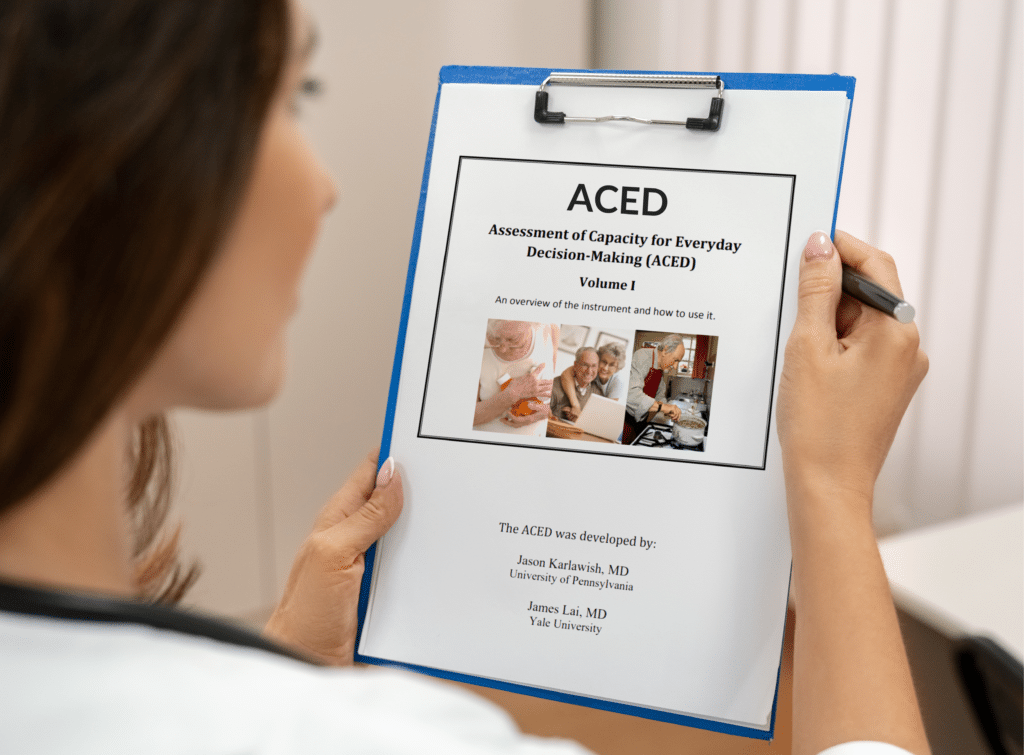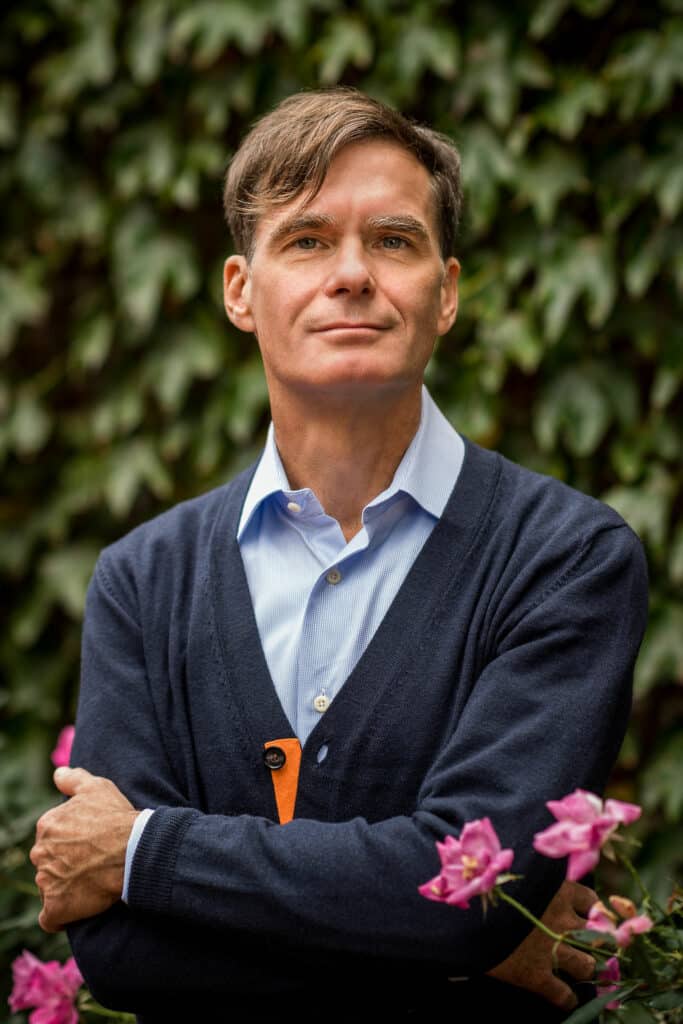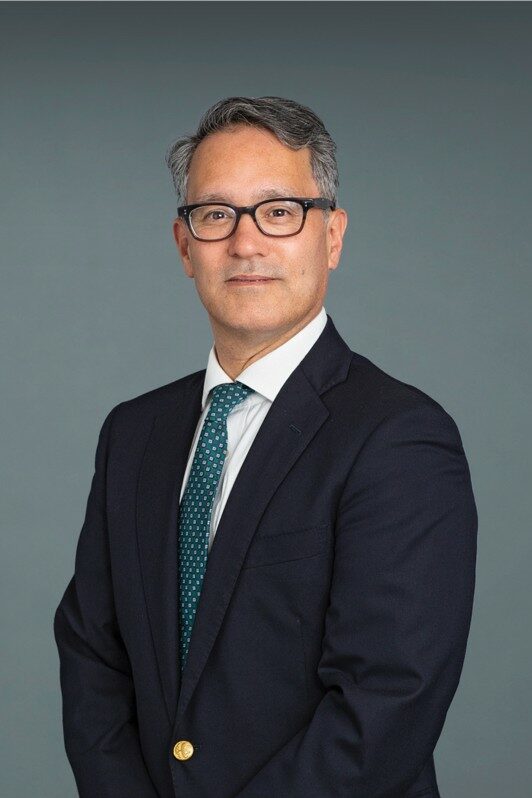
How the Assessment of Capacity for Everyday Decision-making, or ACED, launched a revolution in the elder care
By Meghan McCarthy
August 2023
Seventeen years ago, on a visiting lectureship to the Geriatrics Division at Yale University, Jason Karlawish, MD, was approached by James Lai, MD. The young physician-in-training wondered if Dr. Karlawish would be open to collaborating on a research idea. Could we develop a measure of a person’s capacity to solve everyday problems?
Dr. Karlawish replied with a resounding “yes,” quickly embracing the role of mentor.
Looking back, he summed up the decision he faced: “This was in the days before Zoom and texting and such, and James was junior and working far away at a different institution. Together, that presented challenges. He couldn’t just stop into my office with a question. But never mind that, I decided. James’ timing was auspicious. I was deeply engaged in research to develop and validate instruments that assess decisional capacity.”
They set to work.
Over the ensuing two years, with frequent phone calls and emails and, in time, trips to Yale and Penn, the two developed the ACED — Assessment of Capacity for Everyday Decision-making — an interview designed to assess a person’s ability to solve an everyday problem caused by cognitive impairment, such as difficulties managing finances or preparing a meal.
In years to follow Dr. Lai’s email, over 1,000 clinicians have requested a copy of the tool.
“I continue to be amazed at how the ACED answers a need,” said Dr. Karlawish. “Each week, I receive requests from physicians, psychologists and social workers requesting a copy. They come from all over the world. Australians are frequent requestors. It has been translated into French and Chinese. Soon into Italian.”
A Resource for Everyday Choices

Jason Karlawish
Decisional capacity describes an individual’s ability to use information to make a choice, such as learning about a medication that might help memory and then deciding whether to take it. This capacity can be parsed into the four decisional abilities: understanding, appreciation, reasoning, and expressing a choice.
For most adults, decision making is an effortless activity. But for persons living with Alzheimer’s disease and other diseases that cause mild cognitive impairment or dementia, such as Lewy Body disease, decision-making capacity is often a challenge.
Early in the disease, these challenges are subtle. A person may need more time. She might struggle to learn about the medicine, but after she does, perhaps aided by writing down key facts, she can make the decision.
Over the course of disease, as cognitive problems worsen, decisional abilities often become impaired.
A person may make mistakes, avoid important decisions, or fall victim to others who promise help but instead exploit the vulnerable adult. Clinicians and families often struggle to decide whether a person who has these troubles should be allowed to continue making decisions or should other people step in.
An assessment of decision-making capacity informs this ethically charged decision.
At the time Drs. Karlawish and Lai set to work, there were some tools to assist clinicians and families that measured specific kinds of decision-making capacity. The most common were tools to assess the capacity to enroll in research or to take a treatment.
“Looking back, I can understand why the earliest work in this field focused on research or medical care decisions,” said Dr. Karlawish. “Those are often organized by the ethic of informed consent, especially the decision to enroll in research where an investigator must assure that a person is capable, has the capacity, to sign on to the research study.”
A Different Kind of Decision
Drs. Karlawish and Lai were focused on a different kind of decision. They were interested in the seemingly ordinary ones people make throughout their day — paying bills, cooking, driving a vehicle.
For these kinds of decisions, a clinician and family struggle. Is he able to put together a plan to reliably pay his bills? Or make sure meals are available? Can they safely manage medications?
“It was hidden in plain sight,” said Dr. Karlawish. “There are a lot of daily decisions that people make that may not be as high-octane as enrolling in a research study, but a person’s ability to solve them has a tremendous impact on her wellbeing and ability to preserve her sense of self. They’re tremendously ethically relevant.”
They called this ability to manage daily decisions “everyday decision-making capacity.”
Someone who has this capacity is choosing how they want to live their daily life.
For example, if someone with mild dementia caused by Lewy Body disease is taken advantage of repeatedly or exploited, is it because he lacks the ability to decide to change the relationship, or is the person willingly accepting a relationship that, while harmful, in some respects, they still value?
“It is a huge ethical issue, and there had been limited attention in the ethics literature addressing it,” Dr. Karlawish explained. “Especially attention to developing an assessment tool that can guide a clinician to decide is a person is capable of refusing help.”
Drs. Lai and Karlawish developed the ACED, or the Assessment of Capacity for Everyday Decision-Making, an instrument that assesses a person’s ability to solve everyday problems for people living with cognitive impairment.
A Uniquely Structured Tool

James Lai
The ACED interview analyzes a person’s four decision-making abilities: understanding, appreciation, reasoning, and expressing a choice.
Unlike depression scales or measures of cognition that ask questions whose answers are fixed choices, the ACED uses open-ended questions.
After conducting the interview, the ACED interviewer interprets the results using a well-defined ACED scoring system. The scoring relies on assessing the quality of the answers. It requires judgment from the interviewer on whether to probe further or to move on to the next question.
“Our goal is to give people the skills and tools to have an organized and structured conversation,” said Dr. Karlawish.
While ACED has many strengths, perhaps its greatest is that it is customized for each person and the decision she faces.
Important use cases include Adult Protective Services (APS) professionals. In this scenario, an APS Investigator is called in to investigate cases of suspected abuse or exploitation.
Drs. Lai and Karlawish discovered that in most of these situations, the state of practice was disturbing.
“We found that most APS investigators were not actually assessing decision-making capacity. Instead, they were measuring cognition, and using those scores to stand for capacity. This is simply not correct. Impaired cognition does not equate to impaired decision-making capacity.”
Take, for example, Jim, a person with Alzheimer’s disease, who has been falling at home. A neighbor worries Jim is unsafe. So, the neighbor calls APS.
APS comes over to assess how Jim is doing. They propose bringing in a homemaker to assist with housework and installing a ramp to limit the need to climb stairs. Jim refuses the help. Does he have the ability to make this decision?
Cue the ACED.
The ACED is designed to focus on the problem at hand. Does Jim understand the harms of falling? Meaning, does he know that a fall can cause broken bones and may require a person to go to hospital? Does he appreciate these harms? Meaning, does he acknowledge he’s falling?
Jim’s answers will inform whether he has the capacity to accept or refuse help at home.
APS investigation is a classic use case. The ACED is also a useful tool for other kinds of professionals who interact with persons with cognitive impairments, such as clinicians, social workers, nurses, and psychologists.
“There are a host of professionals whose job is to decide about whether an individual can make the decisions they need to solve their problems,” said Dr. Karlawish. “The stakes are really high.”
The ACED almost never happened.
At the time Drs. Lai and Karlawish set to work, several people doubted the ACED’s value and importance.
“James called me, crestfallen after a difficult meeting with various research leaders who just didn’t see the value in the project. He didn’t know what to do,” said Dr. Karlawish. “To me, it was simple: don’t give up. This is too important.”
The pair persisted.
Worldwide Impact
The tool has been requested from individuals throughout the United States and the world.
As Dr. Karlawish looked over the list of the hundreds of people who have requested the ACED, he reflected, “It’s been extremely rewarding, the depth, breadth, and reach of where individuals come from. This list proves what started out as a good hunch. There’s a huge and unmet need. It drives us to do this work.”
Sara Medina-Bielski, MD, a geriatric medicine specialist at the Mayo Clinic, has used the ACED to assess the appropriateness of a patient deciding to live alone at home and with hospitalized patients who want to care for themselves upon discharge.
Dr. Medina-Bielski summed up her experience. “I love the ACED. The tool is a very helpful starting point for conversations, is easy to follow, and provides objective data to share with family members and patients.”
Karin Taifour, a licensed mental health counselor and geriatric mental health specialist based in Washington state, first learned about ACED at an elder abuse conference in Seattle. Since then, she has integrated it into her practice.
“I’ve been using the ACED/SPACED in my capacity assessments,” Taifour explained. “They have been phenomenal tools for my work and I’ve included it in trainings on assessing decisional capacity.”
The tool has been requested by occupational therapists across the world, ranging from individuals in Massachusetts and Rhode Island to Australia, Nova Scotia, and Israel.
In the Sunshine Coast Community of Care, which offers home care assistance, interest in ACED stemmed from supporting vulnerable adults in the community of Sechelt, British Colombia.
As a dementia counselor at Dementia Australia, Sonie Wilson first learned of ACED at a webinar where Dr. Karlawish spoke about decision-making capacity and how to assess it.
“There is so much uncertainty with dementia, and family members want some kind of solid ground in making informed decisions or respecting those of their loved one,” said Sonie. “The ACED helps me unpack the idea of decisional abilities with family carers and encourage them to not jump to conclusions.”
The ACED is also being used to train the next generation of clinicians.
At the University at Buffalo Jacobs School of Medicine, the tool was requested as supplementary teaching for medical students’ biomedical ethics education coursework.
Medical students at the University of Nevada Reno, KU Leuven School of Medicine in Belgium, Yale, the University of Washington, and the University of Central Florida have all utilized the ACED to further their clinical skill and research endeavors.
In addition to its worldwide impact, Dr. Karlawish has also worked with Mark Lachs, MD, MPH, at Cornell University to adapt the ACED into a specialized tool for APS Investigators called the IDA, or Interview for Decisional Abilities.
“We envisioned the IDA to focus on identifying the most imminent risk and then the client’s ability to think their way through that imminent risk,” said Dr. Karlawish.
Every county in the US has an APS. The ultimate goal is to train all APS investigators in how to use the IDA.
“Our goal is nothing short of a revolution,” said Dr. Karlawish. “We want to transform the practice of Adult Protective Services from an old model of using crude cognitive measures to using specialized decision-making capacity tools.”
Looking back, Dr. Karlawish credits Dr. Lai for his initiative and resilience. “What started out a junior researcher in search of a mentor and almost fell apart when senior faculty opposed it has in time blossomed into one of the most rewarding mentor-mentee collaborations I’ve had,” said Dr. Karlawish.
If you are interested in requesting a copy of the ACED, please click email Dr. Jason Karlawish at Jason.Karlawish@pennmedicine.upenn.edu.













